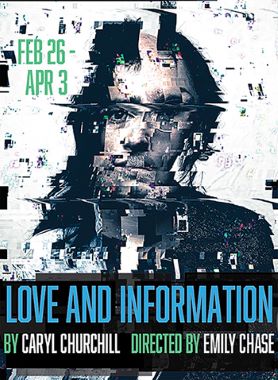LOVELESS DISINFORMATION
As I’m ushered into Antaeus Theatre Company’s mainstage theater at Kiki & David Gindler Performing Arts Center in Glendale to see Love and Information, I’m invited (as evidenced by a freshly painted sign) to “embark on an exploration of meaning.” In the 90 painful minutes that follow, however, this promised “meaning”—like Godot—never shows. (Would a sign, bold as the emperor’s new clothes, really lie to me?) I had come to Antaeus in the hopes of seeing another quality, thought-provoking work by the experimental playwright Caryl Churchill. (The octogenarian, with over 50 plays under her belt, wrote this piece a decade ago at the age of 74.) I’ve seen a few of Churchill’s earlier, more notable works, including Antaeus’s productions of Cloud Nine and Top Girls (both solid iterations), as well as a memorable production of The Skriker years back in Chicago. These experiences were compelling, if strikingly peculiar. My experience with the Emily Chase-directed Love and Information, however, was akin to theatrical waterboarding.
Darius De La Cruz and Kevin Matsumoto
With each excruciating drip, the play features around 100 characters in 50 or more unrelated vignettes, each running 30 seconds to three minutes in length—just enough time to prevent getting invested. The script allows for changes in scene order and the inclusion of bonus vignettes. There are no named characters, no suggested cast size or requirements, and no indication for who speaks which lines of dialogue. (Chase’s cast consists of eight actors: John Apicella, Anne Gee Byrd, Darius De La Cruz, Kwana Martinez, Kevin Matsumoto, Erin Pineda, Lloyd Roberson II, and Zoe Yale.) Character backstories and contexts of scenes are open to interpretation. The dialogue is jagged, fragmented, stylized. Characters cut each other off and speak in nonsensicals, generalities, or about things of which the audience isn’t privy. They also speak similarly to one another across scenes. The result is a production where both actors and “characters” are interchangeable (thus replaceable) and as unmemorable as the next.
Erin Pineda
Despite little in this production working, I can understand the play’s allure for those working on it. Think of all the questions to be solved: Who are we? Where are we? What’s the context? What does any of this mean? Churchill provides both directors and actors a lot of free reign. But as somebody, somewhere, once said: “with great freedom comes great responsibility.” That’s where this production falls apart. Yes, the script is incredibly challenging; many would say indecipherable. But even if the actors did understand what they were saying, rarely was it clearly communicated to the audience. Many scenes were over-delivered, as if heightened dramatics would somehow invoke meaning; others were under-delivered, which only invoked shrugs from the audience. I don’t know if the actors were having fun, but I saw audience members sleeping—perhaps dreaming of something more compelling.
Erin Pineda and Zoe Yale
So, “What’s it all about, Alfie?” you ask. Who knows. Meaning? Memory, maybe? The failures of human connection? Perhaps it’s “about” the emptiness found in an increasingly isolating age of technology wherein everything, everywhere—even love itself—is just cold, heartless information. (“Embark on an exploration of meaning!”) I wish I had more answers—if that’s the point. All I know is that while watching an assembly line of monotony wherein one mind-numbing vignette unceremoniously followed the next, I increasingly, and quickly, stopped caring.
John Apicella and Anne Gee Byrd
Credit where credit’s due, the technical aspects of this production are commendable. The design is simplistic, sleek. A three-tiered, monochromatic set by Frederica Nascimento (lit crisply by Christine Ferriter) features a plush couch and a handful of chairs; otherwise, it’s empty. The walls, minus a painting, are bare. Upon this minty-cool setting pop a wide array of costumes by Angela Balogh Calin) as Ly Eisenstein projects looping and stuttering video calls and other pre-recorded imagery—further imbuing an overall dissonance within the work and audience (cinematography by cast member John Apicella, sound design by John Zalewski).
Kevin Matsumoto, Zoe Yale, John Apicella
That Love and Information received many positive reviews after its 2012 debut is puzzling. It’s not a great script. Perhaps artsy elites want to pretend they “get it.” Or maybe having Churchill’s name attached unnecessarily upped its importance. It’s likely, I believe, that past productions were presented with much more directorial clarity. That all said, maybe it’s me who simply doesn’t “get it.” Okay, fine; that doesn’t change my experience with this particular production. Regardless of all of this, however, the work, I predict, is unlikely to bring newbies into the theater. If it does, it could pose as a deterrent in bringing them back. I don’t say this to prevent theaters from tackling experimental work; I wish more theaters did. I say this to address the reality of this production. There’s little to love here, little to make sense of. Even within the play’s diegesis, there’s no outside perspective to comment on any of what we are seeing, nor is there a clearly defined throughline. When a character opines, “I’m sorry, I’ve nothing to say. Nothing seems very interesting,” I thought, Finally, taking an empathetic glance at my sleeping neighbor, the first honest moment of the night.
Kwana Martinez and Lloyd Roberson II
photos by Jenny Graham
Love and Information
Antaeus Theatre Company
Gindler Performing Arts Center, 110 East Broadway in Glendale
Fri at 8; Sat at 2 & 8; Sun at 2; Mon at 8
ends on December 16, 2019
for tickets ($40), call 818.506.1983 or visit Antaeus

